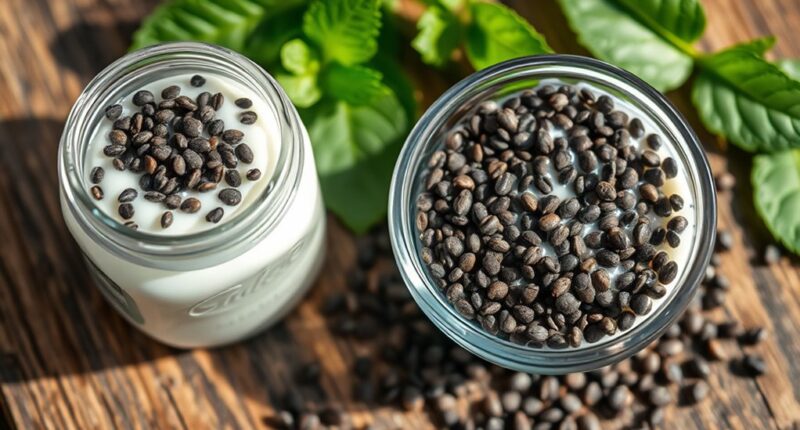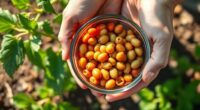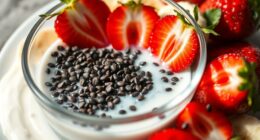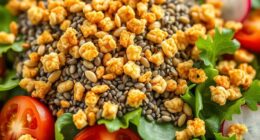Prebiotics and probiotics both support your gut health but in different ways. Prebiotics like chia seeds provide soluble fiber that feeds your existing beneficial bacteria, helping them grow and stay active. Probiotics, on the other hand, introduce live bacteria directly into your digestive system to restore balance. Chia seeds don’t contain live bacteria, but they serve as a natural prebiotic. Keep exploring to discover how combining these can optimize your gut health.
Key Takeaways
- Chia seeds are a prebiotic source due to their soluble fiber content, supporting beneficial gut bacteria growth.
- They do not contain live bacteria, so they are not considered probiotics.
- Incorporating chia seeds into your diet enhances fiber intake and promotes a healthy microbiome.
- Probiotics involve consuming live beneficial microorganisms found in fermented foods or supplements.
- Using both chia seeds and probiotic foods or supplements can synergistically improve gut health.
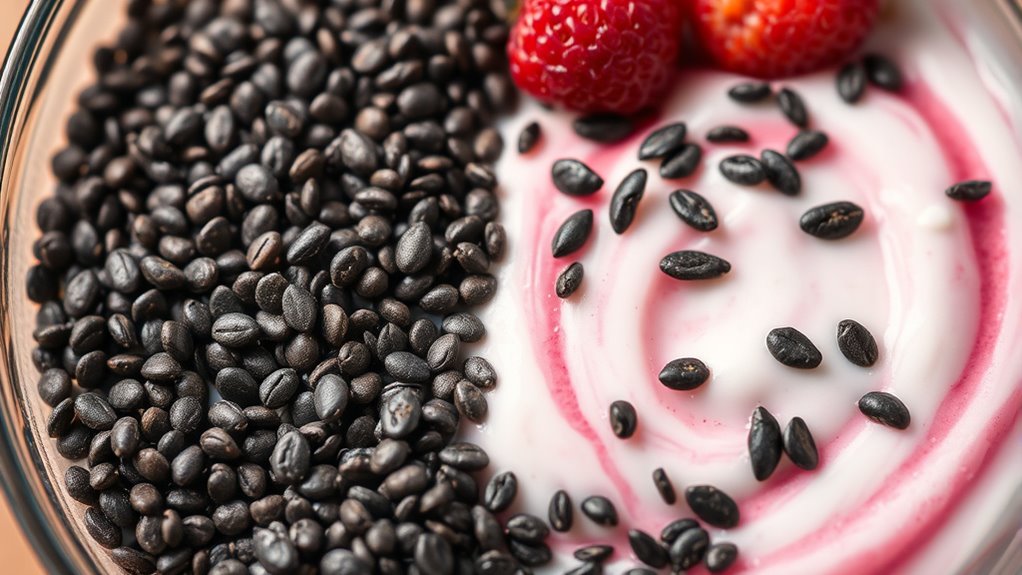
Have you ever wondered how prebiotics and probiotics differ in supporting your gut health? Understanding this distinction is key to optimizing your dietary choices and improving your overall well-being. Prebiotics are essentially food for your beneficial gut bacteria, helping them thrive and multiply. On the other hand, probiotics are live bacteria that you introduce directly into your digestive system, aiming to boost your gut flora balance. Both play pivotal roles, but they function differently and come from different dietary sources.
Prebiotics are found in non-digestible fibers and compounds that pass through your stomach largely intact, reaching your intestines where they serve as nourishment for your existing beneficial bacteria. Common dietary sources include foods like garlic, onions, leeks, and bananas. These foods help maintain a healthy gut environment by encouraging the growth of bacteria that produce essential nutrients, bolster your immune response, and improve digestion. Incorporating prebiotic-rich foods into your diet is a proactive way to support gut health naturally, without relying solely on supplements.
Prebiotics are non-digestible fibers that nourish beneficial gut bacteria, supporting digestive health naturally.
Probiotics, however, are live microorganisms found in fermented foods and supplements. When consumed, they add new bacteria to your gut, aiming to restore or enhance the balance of your gut microbiome. Popular dietary sources include yogurt, kefir, sauerkraut, kimchi, and other fermented vegetables. These foods introduce beneficial strains of bacteria directly, which can be especially helpful after antibiotics or when experiencing digestive issues. Probiotic supplements are also available for targeted health benefits, but it’s important to choose strains backed by research.
Chia seeds, often celebrated for their nutritional profile, fit into this conversation as a dietary source that primarily provides prebiotic benefits. They contain soluble fiber, which resists digestion and feeds your gut bacteria, supporting a healthy microbiome. When you add chia seeds to your smoothies, yogurt, or oatmeal, you’re not only increasing your fiber intake but also fostering an environment where beneficial bacteria can flourish. While chia seeds don’t contain live bacteria like probiotic foods, they serve as a valuable dietary source of prebiotics that complement your probiotic-rich foods. Additionally, proper wood stove safety practices, such as regular chimney cleaning and ensuring proper installation, are essential to prevent fire hazards when using a stove.
Frequently Asked Questions
Can Chia Seeds Replace Probiotics in Gut Health?
Chia seeds can’t replace probiotics for gut health, but they do support your digestive system. They’re a great source of fiber supplementation, which helps promote healthy bowel movements and feed beneficial gut bacteria. While probiotics introduce good bacteria directly, chia seeds strengthen your immune system and improve gut function indirectly. Incorporate chia seeds into your diet for added fiber, but consider probiotics for targeted gut flora benefits.
Are Chia Seeds Considered Prebiotics or Probiotics?
Think of chia seeds as tiny treasure chests filled with fiber boost and a rich nutrient profile. They aren’t probiotics, which are live beneficial bacteria, but they act as prebiotics by nourishing your gut’s good bacteria. When you include chia seeds in your diet, you’re fueling your digestive health naturally, helping your gut thrive. So, while they don’t contain probiotics, they support your gut’s ecosystem in a powerful way.
How Do Chia Seeds Support Digestive Health?
Chia seeds support your digestive health by promoting fiber fermentation in your gut. The high fiber content helps feed your gut microbiota, encouraging healthy bacteria growth. As your gut bacteria ferment the fiber, they produce beneficial compounds that enhance digestion and reduce discomfort. Incorporating chia seeds into your diet can improve regularity and overall gut function, making them a simple, natural way to boost your digestive wellness.
Can Chia Seeds Benefit Those With Gut Sensitivities?
If you have gut sensitivities, chia seeds might help by supporting fiber fermentation and promoting a healthy gut microbiota. The soluble fiber in chia seeds feeds beneficial bacteria, aiding digestion and reducing discomfort. You should start with small portions and observe how your body reacts, as their gentle prebiotic effect can improve your gut health without irritation. Incorporating chia seeds could be a natural way to soothe sensitive digestive systems.
What Is the Recommended Daily Intake for Gut Benefits?
Think of your gut as a garden that needs regular tending. For gut benefits, aim for about 25-30 grams of fiber intake daily, as recommended by dietary guidelines. Chia seeds are a powerhouse, providing roughly 5 grams of fiber per tablespoon. Incorporate 1-2 tablespoons daily into your meals to boost fiber intake naturally, supporting healthy digestion and overall gut health.
Conclusion
Think of chia seeds as tiny architects in your gut’s city, quietly building a healthy foundation. While they’re not probiotics that actively add new residents, they’re the prebiotic scaffolding that helps your good bacteria thrive. Together, they’re a symphony of balance, each playing its part in harmony. By including chia seeds in your diet, you’re planting seeds of wellness that grow into a resilient, flourishing community inside you—a thriving garden of health waiting to bloom.
